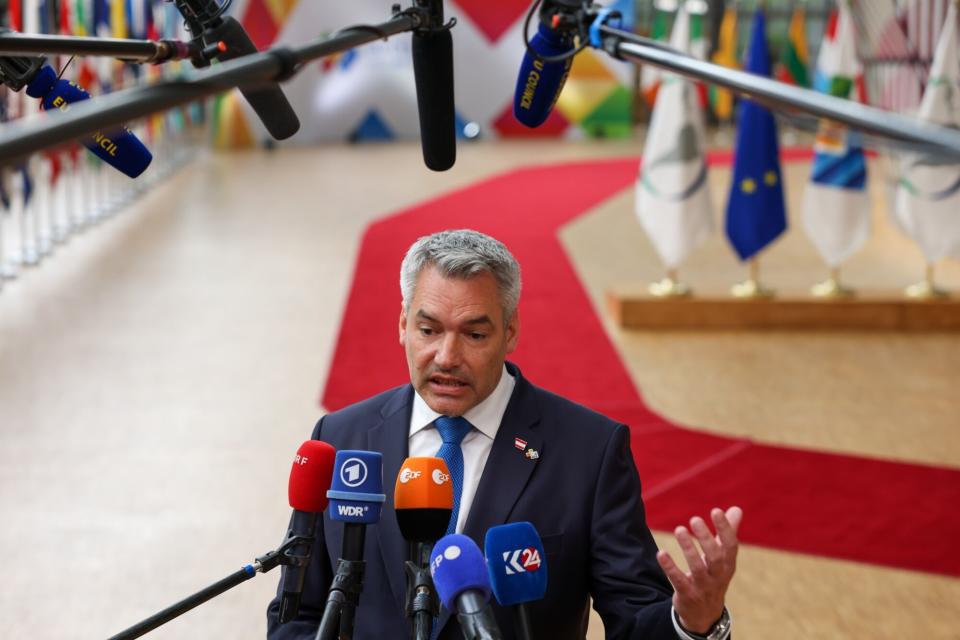Alleged Kremlin Double Agent Rattles Austria Ahead of Elections
(Bloomberg) -- The arrest of a senior counter-intelligence official, alleged to have traded secrets for Kremlin cash, is upending Austrian politics ahead of national elections and cementing the nation’s reputation as a haven for spies.
Most Read from Bloomberg
US Slams Strikes on Russia Oil Refineries as Risk to Oil Markets
Bond Trader Places Record Futures Bet on Eve of Inflation Data
Iran’s Better, Stealthier Drones Are Remaking Global Warfare
Austria’s government will convene an extraordinary session of its national-security council late Tuesday in Vienna. The meeting follows the arrest at the end of March of Egisto Ott, 61, an Austrian spy who allegedly also worked for Russia.
Ott has consistently denied working for Russia, suggesting in a 2021 interview that he witnessed other Austrian officials abusing surveillance powers.
“The security situation in the republic needs to be assessed and clarified,” Chancellor Karl Nehammer said last week. “We need to prevent Russian spy networks from threatening our country by infiltrating or exploiting political parties or networks.”
With parliamentary elections due by October, Austria’s ruling conservatives are using the scandal to portray right-wing populists as security risk because of past connections with Russian President Vladimir Putin’s party. The Freedom Party, currently leading in the polls, rejects the accusations.
“The People’s Party will build on this thematic up to and throughout the election campaign later this year,” said Marcus How, a geopolitical risk analyst at VE Insight.
Read More: Europe’s Spy Capital Eyes Crackdown on Intelligence Industry
But the scandal is also increasing the scrutiny on Austria from western partners concerned about weak points that the Kremlin could exploit. While Austria has been a member of the European Union since 1995, it has remained outside of the NATO military alliance, even as other previously neutral countries like Sweden and Finland rushed to join in the aftermath of Russia’s invasion of Ukraine.
Foreign intelligence services put down roots in Austria in the wake of post-World War II racketeering scandals portrayed in Carol Reed’s film The Third Man. Their activity increased during the Cold War as spies sought an edge in major Vienna-based institutions including the International Atomic Energy Agency and Organization of the Petroleum Exporting Countries.
“The very limited legal options available to counter espionage lead to an extremely high incidence of foreign intelligence and secret services in the country,” Austria’s own spy operation, the Directorate State Protection and Intelligence Service, said in its most recent annual report.
Justice Minister Alma Zadic last week said that legal loopholes which allow spying — as long as it’s not directed against Austria — need to be tightened.
“The case of Ott puts more meat on the bones of the suspicions western security agencies harbor toward their Austrian partners,” How said. “He was able to access classified information with remarkable ease. This kind of complacency is not reassuring.”
Prosecutors have been investigating Ott’s Russian connections since 2017 when he began tracking the movements of a renegade Kremlin agent, according to a copy of the 86-page arrest warrant seen by Bloomberg. After a brief suspension and reassignment, investigators say he continued trafficking classified information for cash.
The arrest warrant alleges that among other things Ott:
Provided sensitive information to Wirecard fugitive Jan Marsalek, who is wanted for fraud and is suspected of having links to Russian secret services
Handed over cellphone data of several senior Austrian officials
Collected information about people of interest to Russia and shared some of those findings with Marsalek
Supplied Marsalek with the Vienna address of Bellingcat investigative journalist Christo Grozev. A team later commissioned by Marsalek broke into Grozev’s apartment where they stole a laptop and a USB stick
Helped Marsalek smuggle to Moscow a stolen SINA laptop, a device used by European governments to transmit encrypted information
Drafted an analysis with recommendations for improvement following the murder in 2019 of a Chechen dissident in Berlin at the behest of Russian authorities
Other western intelligence agencies have raised security issues with their Austrian counterparts and those concerns rose in the wake of a 2018 inter-agency raid overseen by officials in the right-wing Freedom Party who were then in government. That event risked compromising sensitive sources, prompting some allies to rein in intelligence sharing.
The warrant against Ott was only filed after UK prosecutors last month revealed new information linking the Austrian to a wider European spy network connected to Marsalek. Ott was friendly with another Austrian fugitive agent who helped Marsalek escape, presumably to Belarus or Russia.
--With assistance from Alberto Nardelli.
Most Read from Bloomberg Businessweek
How Bluey Became a $2 Billion Smash Hit—With an Uncertain Future
Everyone Is Rich, No One Is Happy. The Pro Golf Drama Is Back
Power Bills Will Keep Rising Even After the Fed Tames Inflation
©2024 Bloomberg L.P.



